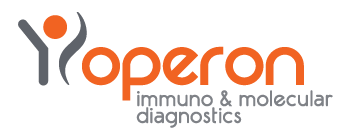OPERON was established as a private Research and Development (R&D) laboratory in the field of Immunochemistry. Nowadays, we are producing and exporting our immuno and molecular in vitro diagnostic products to more than 50 countries all over the world.
Immunochromatography tests, or rapid tests, are a type of rapid diagnostic test based on the detection of the presence or absence of certain substances in a biological sample (blood, urine or saliva, among others).
Molecular diagnostic tests are used to detect the presence of genetic material, such as DNA or RNA, in a biological sample susceptible to a disease-related gene or pathogen related to a disease.
Our Brands
Operon

HLA B5701 Strip
Test for the detection of HLA-B5701 alleles HLA B5701 Strip kit is a test based on the reverse hybridization principle, which allows the determination of HLA B5701 alleles, test is intended for use with samples from HIV-1 infected patients in the process of diagnosing the abacavir hypersensitivity.
High PapillomaStrip
High PapillomaStrip and High+Low PapillomaStrip are two tests based on the reverse hybridization principle, which allows the qualitative detection and genotyping of 19 and 37 subtypes (respectively) of Human Papillomavirus (HPV) in DNA samples extracted from cervico-uterine smears or biopsies, penis swabs or urine.
High+Low PapillomaStrip
High PapillomaStrip and High+Low PapillomaStrip are two tests based on the reverse hybridization principle, which allows the qualitative detection and genotyping of 19 and 37 subtypes (respectively) of Human Papillomavirus (HPV) in DNA samples extracted from cervico-uterine smears or biopsies, penis swabs or urine.
Lateral Flow Reader
The OPERON rapid strip reader allows an objective reading and interpretation of the results obtained in the rapid tests, very useful in those borderline cases that generate doubts or where the human eye is not able to perceive the bands. In addition, it has an export system that allows the specialist to collect the data and transfer it to the patient’s file, so that all the results are perfectly traced.
Simple CD1WB
The Simple CD1WB test allows the detection in blood, plasma or serum of antibodies (IgA/IgG/IgM) directed against human tissue transglutaminase, the main autoantigen recognised by anti-endomysial antibodies. The latter is especially indicated for paediatric patients under 16 years of age, and is available in authorised pharmacies.
Simple CD2WB
The Simple CD2WB test allows the detection of IgA anti-gliadin and anti-human tissue transglutaminase antibodies in blood and/or serum. The latter is especially indicated for paediatric patients under 16 years of age, and is available in authorised pharmacies.
Simple Campylobacter
At least one in ten people fall ill each year due to the consumption of unsafe food. Campylobacter is second in the ranking of bacteria associated with such consumption only behind Salmonella (28% vs. 42%), although this percentage is thought to be higher, as Campylobacter is often under-diagnosed. In fact, an important characteristic of Campylobacter is its infectivity – only about 800 microorganisms can cause infection. Annually, 550 million people are infected with Campylobacter, and in 90% of cases it is usually the C. jejuni strain that causes the infection. So far, culture has been the traditional method for Campylobacter identification. However, rapid tests are becoming increasingly important in its detection as, being a bacteria, early antibiotic treatment would help to treat the most severe symptoms as soon as possible. The Simple/Stick Campylobacter rapid test provides a good indication of the possibility of having acquired C. jejuni or C. coli.
Simple GDH-TOXINS
C. difficile is a bacteria considered to be responsible for approximately 25% of the diarrhoea associated with the consumption of antibiotics. In addition to these symptoms, the disease can lead to other complications (such as pseudomembranous colitis – PMC) that require urgent antibiotic treatment, as they can be life-threatening. In fact, mortality associated with C. difficile can reach up to 30%. In the diagnosis of C. difficile infection, it is recommended to test all samples for GDH antigen if the origin of the diarrhoea is unknown. In case of a positive GDH antigen test, a second test for toxin A and/or B is recommended. One-step immunochromatographic tests for the differential detection of Glutamate Dehydrogenase (GDH) as well as C. difficile toxins A and B in human faeces.
Simple Rota-Adeno
The OPERON Simple Rota-Adeno tests allow the qualitative detection of Rotavirus antigens in human faeces in independent bands.
Simple Rota-Adeno-Noro
One-step immunochromatographic tests for the qualitative detection of Rotavirus, Adenovirus and Norovirus genogroup I (GI) and genogroup II (GII) antigens in human faeces in independent bands.
Simple Rotavirus
The OPERON Simple Rotavirus tests allow the qualitative detection of Rotavirus antigens in human faeces in independent bands.
